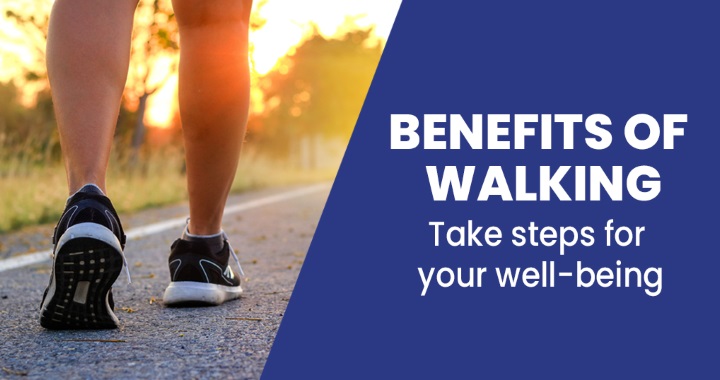Exercise & Fitness
Exercising regularly, every day if possible, is the single most important thing you can do for your health. In the short
term, exercise helps to control appetite, boost mood, and improve sleep.
In the long term, it reduces the risk of heart disease, stroke, diabetes, dementia, depression, and many cancers.
Walking for Health

The simple activity of walking has so many powerful health benefits. Done correctly, it can be the key to losing weight, lowering blood pressure and cholesterol, and boosting your memory, as well as reducing your risk for heart disease, diabetes, cancer and more. Walking for Health, created by the experts at Harvard Medical School, takes you step-by-step from why walking may be the most perfect exercise, to how to get started on a walking program, to specific walking workouts. It even has a special section on walking for weight loss.

The next time you have a medical check-up, don’t be surprised if your doctor hands you a prescription to walk. Yes, this simple activity that you’ve been doing since you were about a year old is now being touted (along with other forms of regular physical activity) as “the closest thing we have to a wonder drug,” in the words of Dr. Thomas Frieden, director of the Centers for Disease Control and Prevention. Judging from the research, it’s a well-earned reputation.

Walking can have a bigger impact on disease risk and various health conditions than just about any other remedy that’s readily available to you. What’s more, it’s free and has practically no negative side effects.

Walking for 2.5 hours a week—that’s just 21 minutes a day—can cut your risk of heart disease by 30%. In addition, this do-anywhere, no-equipment-required activity has also been shown to reduce the risk of diabetes and cancer, lower blood pressure and cholesterol, and keep you mentally sharp. In fact, according to some estimates, walking regularly could save Americans over $100 billion a year in health care costs. Even a quick one-minute jaunt pays off . A University of Utah study in 2014 found that for every minute of brisk walking that women did throughout the day, they lowered their risk of obesity by 5%. No more “I don’t have time” excuses!

Start walking, and you’ll be helping to make your community stronger, too. Social scientists have found that as more people take to the streets, neighborhood crime rates fall and the local economy improves. It’s also a wonderful way to meet new people and connect with neighbors. Take a walk with your children after dinner. It can promote better communication, reduce behavior problems, and improve academic performance.

Walking can even help your mood. A number of studies have found that it’s as effective as drugs for decreasing depression. It can help relieve everyday stresses, too. Tension starts to ease as the road stretches out in front of you. Mood-elevating endorphin levels increase. Many people and that walking helps clear the mind, too—you may even and the solution to a problem that’s been bugging you.
So don’t wait for your next doctor’s appointment to get inspired. Put on your shoes, step out the door, and rediscover the joys of walking.


